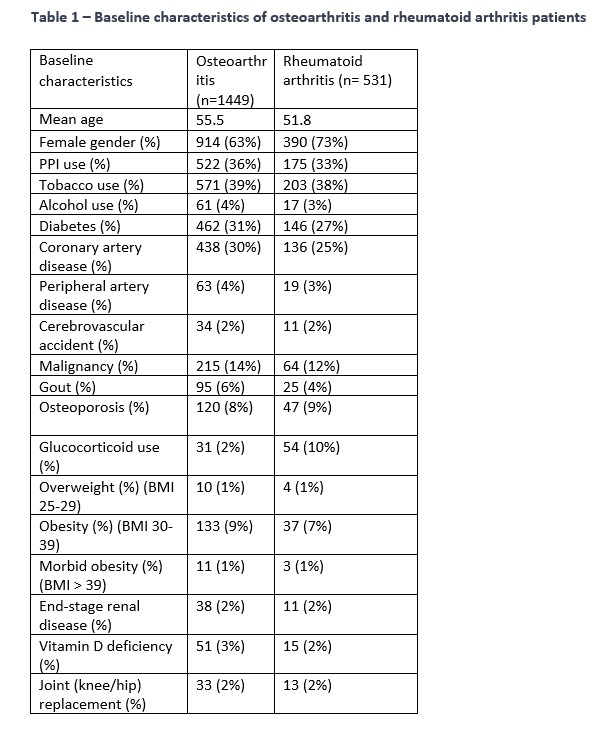Session Information
Session Type: Poster Session A
Session Time: 9:00AM-11:00AM
Background/Purpose: Osteoarthritis and rheumatoid arthritis cause significant joint replacement morbidity. Proton pump inhibitors (PPIs) may contribute to chronic inflammation and joint degeneration due to side effects like hypomagnesemia and gut microbiota dysregulation. However, research on the association between PPI use and joint replacement risk is limited in osteoarthritis and lacks data in rheumatoid arthritis. Our study investigates the link between PPI usage and joint replacement risk in both osteoarthritis and rheumatoid arthritis patients.
Methods: This retrospective analysis included osteoarthritis and rheumatoid arthritis patients diagnosed using ICD10 codes from Northwell Health electronic medical records in 2020-2021. Proton pump inhibitor (PPI) use was confirmed through manual review of medical records. Joint replacement cases (hip/knee) were identified using CPT codes for total hip and knee replacement. Multivariate logistic regression analysis was conducted to compare joint replacement occurrence in PPI users versus non-users, while adjusting for underlying comorbidities. A p-value < 0.05 indicated statistical significance
Results: A total of 1980 patients were included, with 1449 having osteoarthritis and 531 having rheumatoid arthritis. The mean ages were 55.5 and 51.8 years for osteoarthritis and rheumatoid arthritis patients, respectively. Female predominance was observed, with 904 (63%) among the osteoarthritis group and 362 (73%) among the rheumatoid arthritis group. Proton pump inhibitors were taken by 522 osteoarthritis patients (36%) and 175 rheumatoid arthritis patients (33%). Comorbidities that were taken into consideration are tobacco use, alcohol use, coronary artery disease, cerebrovascular accident, peripheral artery disease, diabetes, malignancy, gout, osteoporosis, glucocorticoid use, overweight, obesity, morbid obesity, chronic kidney disease, end-stage renal disease, vitamin D deficiency.
PPI use in individuals with combined osteoarthritis or rheumatoid arthritis significantly increased the risk of joint replacement (OR 1.24, 95% CI 1.10-1.41, p < 0.0004). Among those with rheumatoid arthritis alone, PPI users also had a higher risk of joint replacement (OR 1.31, 95% CI 1.13-1.52, p < 0.0002). However, there was no significant difference in the risk of joint replacement between PPI users and non-users with osteoarthritis (OR 1.03, 95% CI 0.82-1.28, p = 0.78).
Conclusion: In conclusion, our study found that proton pump inhibitors (PPIs) are linked to an increased risk of joint replacement in individuals with combined osteoarthritis or rheumatoid arthritis. This association was significant for patients with rheumatoid arthritis but not for those with osteoarthritis alone. Further research is needed to understand the underlying mechanisms and establish causality. Healthcare providers should consider the potential impact of PPIs on joint health when treating patients with rheumatoid arthritis, aiming to manage comorbidities and reduce the need for joint replacement surgeries.
To cite this abstract in AMA style:
Sangaraju K, Grovu R, Kwark M, Cohen E, Hassan A, Slobodnick A. Use of Proton Pump Inhibitors and Risk of Hip/knee Joint Replacement Among Patients with Osteoarthritis and Rheumatoid Arthritis [abstract]. Arthritis Rheumatol. 2023; 75 (suppl 9). https://acrabstracts.org/abstract/use-of-proton-pump-inhibitors-and-risk-of-hip-knee-joint-replacement-among-patients-with-osteoarthritis-and-rheumatoid-arthritis/. Accessed .« Back to ACR Convergence 2023
ACR Meeting Abstracts - https://acrabstracts.org/abstract/use-of-proton-pump-inhibitors-and-risk-of-hip-knee-joint-replacement-among-patients-with-osteoarthritis-and-rheumatoid-arthritis/

